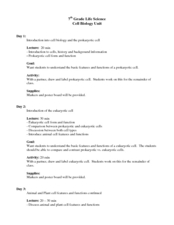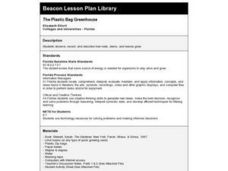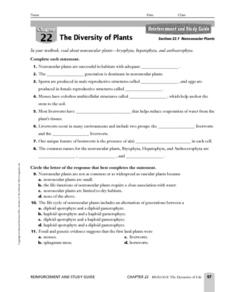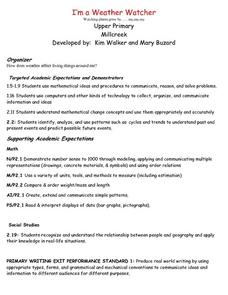Curated OER
Diurnal Cycling Experiments
Students carry out an experiment to monitor diurnal fluctuations in dissolved oxygen, carbon dioxide, pH, and water temperature. They determine the CO2 and pH of the samples (and optionally, dissolved oxygen). Students complete their...
Rainforest Alliance
Investments in Forest Carbon
One hundred metric tons of CO2 can accumulate in one acre of forest over time—that's a lot of carbon! In the activity, groups of middle school learners determine what makes forests important. They then solidify the concept by using a...
Curated OER
The Compost Bucket
Students recognize that plants and soils have a close relationship. They view a photo essay on the common practice and natural process of composting. Afterwards, they observe the process of plant decay over the course of several days.
Curated OER
It's Challenging Being Green!
Learners influence the plant life cycle as they take care of plants.In this caring for plants lesson, students understand the parts of the plant and their functions in keeping it alive. Learners participate in experiments with plants and...
Curated OER
Cell (Biology)
Students conduct a series of activities to explore the nature of cells. In this biology lesson, students observe plant and animal cells under the microscope and compare them. They differentiate osmosis and diffusion.
Curated OER
The Plastic Bag Greenhouse
Third graders observe plants and record their growth. They describe the parts of plants in detail including the roots, stems and leaves.
National Park Service
Reduce Our Carbon Footprint, Let’s Compost!
Roll up your sleeves and get a little dirty with this elementary and middle school compost lesson. All you need is a large plastic container, a couple old newspapers, some organic waste, and a few hundred worms and you're ready to start...
Curated OER
Flowers, Pods, and Seeds
Students gain an understanding of living organisms. the complete a plant growth data log to chart plant growth and to make observations, predictions, and personal reflections.
Curated OER
From One Seed Grow Many Seeds
First graders practice identifying plants by singing a song. In this plant life instructional activity, 1st graders sing the song "Parts of a Plant" which is based on the anatomy of sunflowers. Students discover agriculture techniques...
Curated OER
How Many Trees Can You Grow?
Students solve a story problem about how many trees can be planted in a given area. Using a map, they gather information about the size of the area and the dimensions of an acre. They use a specific equation to determine the area of...
Curated OER
Nonvascular Plants
In this nonvascular plant worksheet, students compare the characteristics of bryophyta, hepatophyta, and anthocerophyta. This worksheet has 8 fill in the blank and 3 multiple choice questions.
Curated OER
Fungus Among Us- Non-Fiction Reading Comprehension Worksheet
In this fungus non-fiction reading comprehension activity, students read a 3 page selection that describes the characteristics and life of fungi. They answer 10 questions based on the reading which include true or false, multiple choice,...
Curated OER
Bugs in the Woods
Second graders identify insects and plants in the forest ecosystem in a structured field trip with stations and activity booklets. In this bugs instructional activity, 2nd graders explore the ecosystem of the forest, complete the...
Curated OER
Little Red Hen
First graders explore biology by identifying plant anatomy in class. In this botany lesson, 1st graders read the book The Little Red Hen and identify the methods used in order to grow successful plants. Students discuss other ways people...
Curated OER
Habitats
Students participate in an online lesson to determine that different plants and animals are found in different habitats. They use food chains to show feeding relationships in a habitat, and see that nearly all food chains start with a...
Curated OER
Testing Soils for Garden Planting
Sixth graders collect soil samples and record the location of the samples by using GPS.
Curated OER
Terrestrial Sequestration - Photosynthesis and Cellular Respiration
Students investigate how plants absorb carbon dioxide during photosynthesis. In this biology lesson, students differentiate photosynthesis and cellular respiration. They discuss the important role of plants in the environment.
Alabama Learning Exchange
Plants, Soil and Nutrients
Young scholars conduct an experiment. They review how to use the scientific method to conduct an experiment with white carnations and food coloring. They create a hypothesis and test it to better understand how plants get nutrients,...
Curated OER
Sun Seeking Plants
Pupils investigate the story "The Tiny Seed" by Eric Carle. This story is used to introduce the children to the concept that seeds change and grow into plants when conditions in the environment including temperature, light, water and...
Curated OER
Gardening for Beauty, Food, and Enjoyment
First graders create their own garden. In this plant lesson, 1st graders discover the essential elements for a plant to grow. They planted their own garden and read the amount of space needed and the sunlight preferred for each plant.
Curated OER
From Seed to Apple
Students identify the stages of apple growth. In this agricultural lesson plan, students read the story I Am Apple and sing the song "Round the Apple Tree." Students place pictures of the stages of an apple into the correct order....
Curated OER
I'm a Weather Watcher Watching plants grow by......my,my,my
Students investigate how weather affects how plants grow. They collect data on weather and plant growth for a week and display the data on a graph. For a culminating experience they design a movie using software that shows plant growth...
Curated OER
Nutrition and Energy Flow
In this energy flow worksheet, students will complete 10 short answer questions based on a food web diagram. Then students will review different cycles in nature including the water cycle, carbon cycle, and energy cycle. This worksheet...
Curated OER
People-Growing and Changing
Second graders study how people grow and change. In this health lesson, 2nd graders describe how they have changed over the years and guess who each student is after looking at everyone's baby pictures.

























